‘Anticiper les jeux‘ (plan ahead for the Games) is a very useful, albeit finicky website that is meant to help residents and visitors to the Paris area prepare for the 2024 Olympic Games.
It is filled with information – from setting up alerts for possible disruption to checking which Metro stations will be closed and planning your routes while travelling during the Games.
However, it is not very user-friendly, and most of the site is currently only available in French.
READ MORE: Which areas will be closed in Paris during the Olympics?
Here are some tips on how to use it;
The home page
There’s a lot on the homepage – anticiperlesjeux.gouv.fr
From left to right, you will see tabs (some with their own dropdown menus) for ‘interactive map’, ‘Getting informed’, ‘I am a private individual’, ‘I am a professional’, ‘I am a local authority’, ‘the cities of the Games’, ‘News’, and ‘Frequently Asked Questions’.
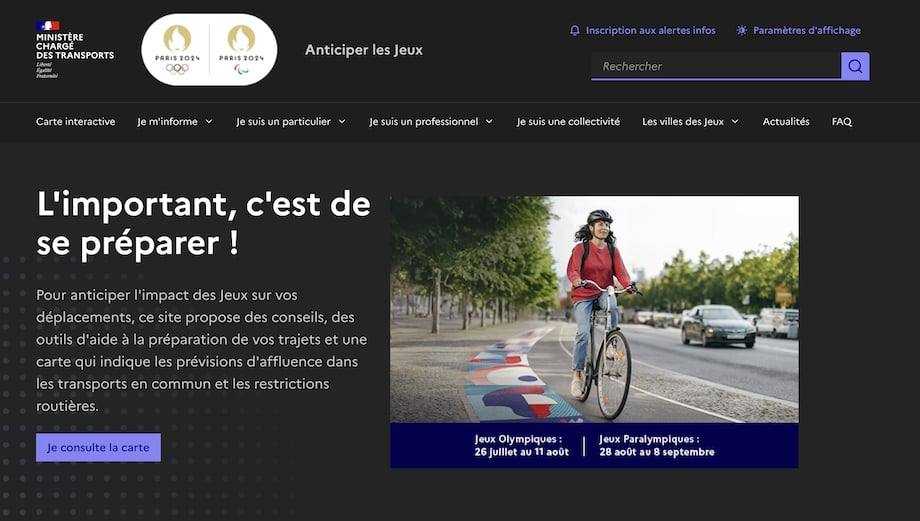
At the top of the page – in the right hand corner – you will find a link for ‘Inscription aux alertes infos‘. This allows you to sign up for email alerts throughout the Games warning you of any disruption.
The segments for ‘I am a private individual’, ‘I am a professional’, and ‘I am a local authority’ will give individual advice to anticipate your day-to-day during the Olympics.
For instance, the section for professionals allows employers to build their own ‘personalised action plan’ that might include encouraging employees to come to work after rush hour, or perhaps instituting a short-term work-from-home.
READ MORE: Hotels, tickets and scams: What to know about visiting Paris for the 2024 Olympics
The interactive map
The most useful section is undoubtedly the interactive map which allows you to search for any disruption by area or by a specific Metro line or road.
Start by clicking on the ‘carte interactive‘, which unlike most of the website does offer you an English version. That being said, the French version works better – sometimes the English one will include random lines of code instead of the text intended to be there.
There is also a tutorial video on how to use the map, but this is only available in French. You can access it here.
You won’t be able to use the map to create an itinerary or request suggestions for faster routes, but you can use it in advance to plan for closures and slow-downs.
To figure out your itinerary, you will instead be able to use the Île-de-France Mobilités app, which will have all the relevant information just prior to the start of the Olympic Games. The Citymapper app will also have live updates.
When you first start using the map, it will populate with lots of unnecessary information, so you’ll need to narrow things down.
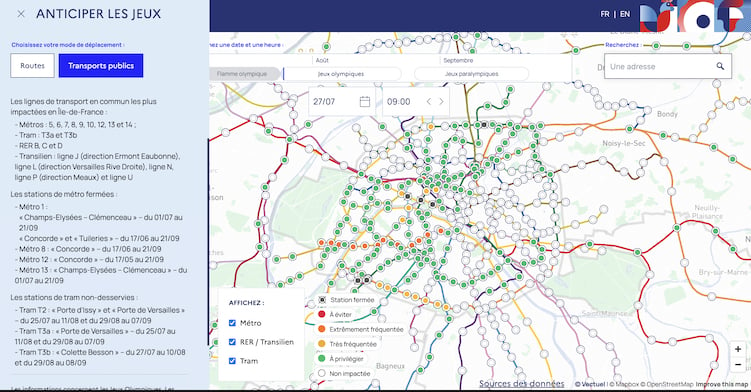
Start by picking your mode of transportation, either by road or by public transport.
If you click public transport, you can select either an entire metro line, to see the possible disruptions (the grey circle with an X means that station is closed, while red circles mean you should expect crowds and delays), or you can select a single station.
Click through the calendar option to see the changing disruption expectations throughout the entire Olympic and Paralympic Games.
For example, you can see the expected disturbances along Paris metro line 1 on July 27th below.
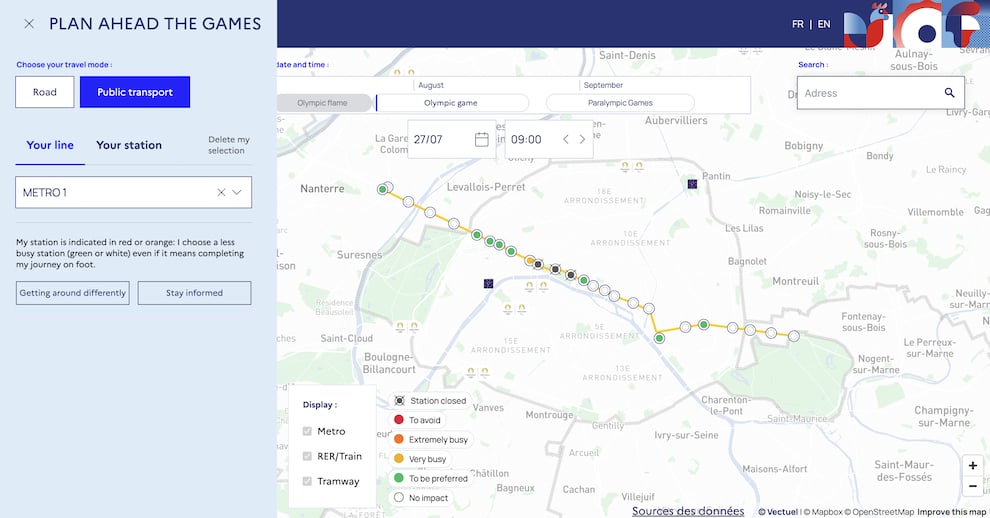
The most severe disruption will be on July 26th, the day of the opening ceremony.
By area
You can also search your address to see whether there will be any Olympic zoning changes or street closures in your area.
As a reminder, shortly before and during the Games, different zones (red, blue, grey and SILT areas) will be introduced in the central parts of the city, with varying levels of strictness to enter them.
Red zones are open to pedestrians and cyclists, but closed to most vehicles; blue zones are open to some vehicles, plus pedestrians and cyclists; grey zones show game venues; SILT/ anti-terrorism areas require a QR code (to be available in May 2024), proof of ID, and either proof of a ticket or your home address to enter. You can learn more about these zones in our guide.
If you click through the dates, you will see whether there is any point during the Olympic calendar when your area will be within one of these special zones.
For example, The Local’s office is located at 34 Quai de la Loire in Paris’ 19th arrondissement.
The area is mostly unaffected by the Games, but on August 3rd, most vehicles will not be able to access the area, as the men’s cycling road race passes through. Pedestrians can access it as normal.
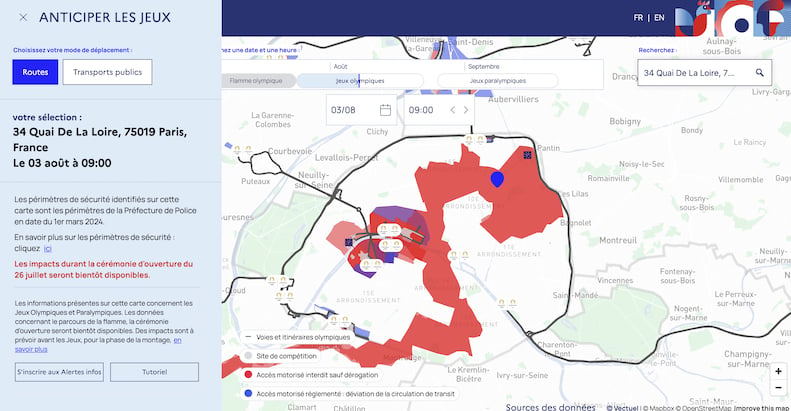
What else can I use the ‘Anticiper les jeux’ website for?
Aside from the interactive map, there are several other hidden gems on the Anticiper les jeux website.
For starters – the FAQ page may have all of your questions already answered, although they are in French.
If you want to read about the planned disruptions – instead of looking at them on the map – then click on the ‘Je m’informe‘ tab. The dropdown menu has the text version of the information you might find on the map for both public transport users and motorists, plus other helpful links.
For example, click on ‘Les impacts sur les routes‘. This will take you to the page that explains road disruption – scroll down to click on voies olympiques to find the calendar and locations of the ‘Olympic lanes’ (the far-left lanes on certain motorways in the Paris region – including parts of the périphérique – that will be dedicated only to accredited Olympics vehicles).
This page will also show you examples of the signage that will inform you of when you are entering a zone with the Olympic lanes in place.
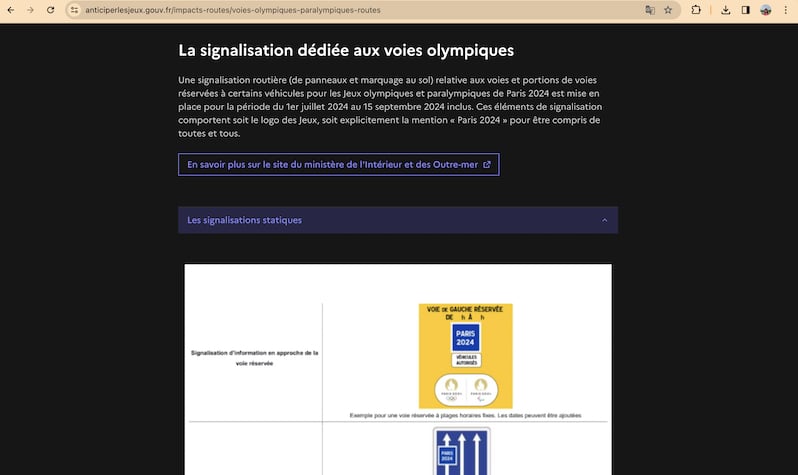
The other helpful page under ‘Je m’informe’ is ‘Se deplacer autrement’.
This page gives advice on how to best get around during the Olympics, depending on whether you are travelling under 2km, 10km, or over 10km.
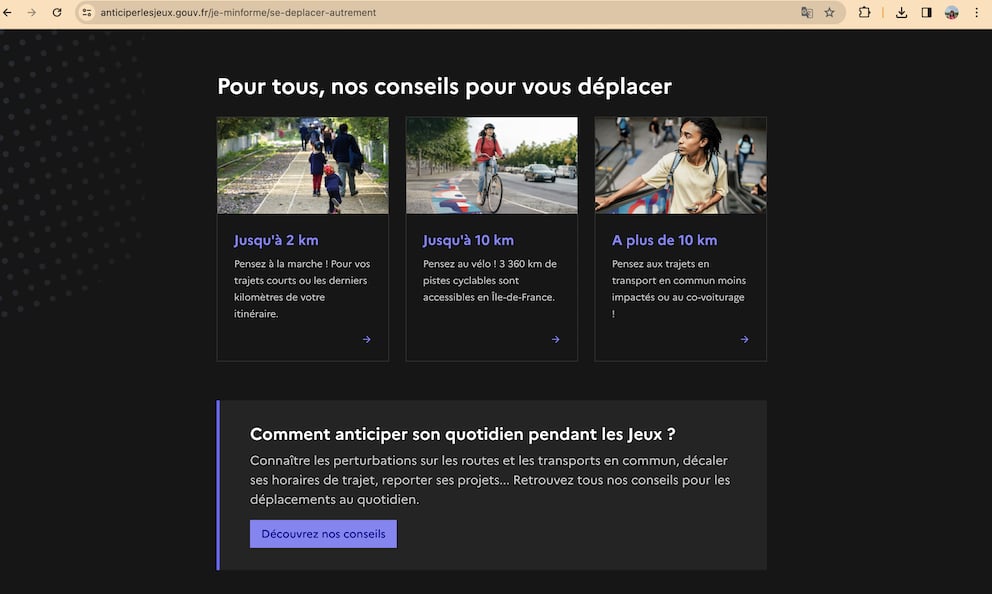
With over 415 kilometres of bicycle lanes, plus thousands of new parking stations across the city and nearby Games venues, it might be easier to get around the city on a bicycle than by car or Metro.
This section of the website also has a downloadable map of the available bicycle lanes.

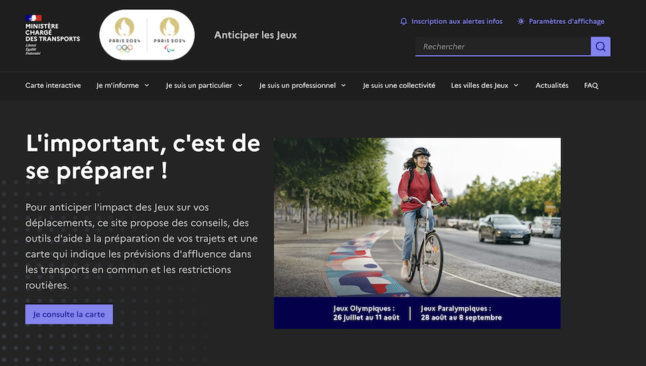

 Please whitelist us to continue reading.
Please whitelist us to continue reading.
Member comments